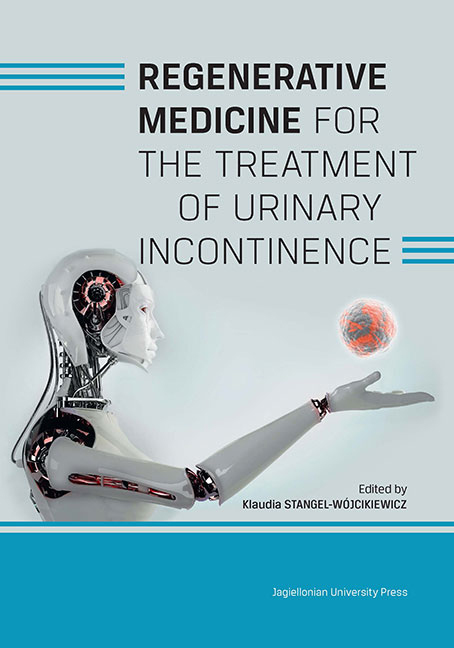Book contents
- Frontmatter
- Contents
- Preface
- Introduction
- Chapter 1 Urinary incontinence in women - outline of the problem
- Chapter 2 Anatomy of the urogenital system
- Chapter 3 Clinical types of urinary incontinence
- Chapter 4 Treatment of stress urinary incontinence
- Chapter 5 Regenerative medicine for the treatment of urinary incontinence
- Chapter 6 Virtual Patient system - simulations of clinical encounters for medical education. Case study of a woman with urinary incontinence
- Chapter 7 Development of a robotic tool aiding a new stem cell-based treatment for stress urinary incontinence in women
- Chapter 8 Difficulties and limitations of cell-based therapy for the treatment of urinary incontinence
- Summary
- List of authors
Chapter 3 - Clinical types of urinary incontinence
Published online by Cambridge University Press: 03 January 2018
- Frontmatter
- Contents
- Preface
- Introduction
- Chapter 1 Urinary incontinence in women - outline of the problem
- Chapter 2 Anatomy of the urogenital system
- Chapter 3 Clinical types of urinary incontinence
- Chapter 4 Treatment of stress urinary incontinence
- Chapter 5 Regenerative medicine for the treatment of urinary incontinence
- Chapter 6 Virtual Patient system - simulations of clinical encounters for medical education. Case study of a woman with urinary incontinence
- Chapter 7 Development of a robotic tool aiding a new stem cell-based treatment for stress urinary incontinence in women
- Chapter 8 Difficulties and limitations of cell-based therapy for the treatment of urinary incontinence
- Summary
- List of authors
Summary
The International Continence Society (ICS), a membership organisation for medical professionals and scientists focused on incontinence issues, was founded by Eric Glen in the 1970s. Because of the variety of complaints and causes of UI, the ICS proposed a classification of UI to standardize nomenclature and help to develop clear diagnostic and therapeutic protocols.
ICS distinguished the following types of urinary incontinence:
- stress urinary incontinence (SUI);
- urgency urinary incontinence (UUI);
- mixed urinary incontinence (MUI);
- nocturnal enuresis;
- post-micturition dribble and continuous urinary leakage.
Stress urinary incontinence
SUI is the complaint of involuntary leakage caused by increased intra- -abdominal pressure.
Grades of SUI classified depending on the severity of symptoms (the Stamey scale) are presented below:
- Grade 1: urine leakage is associated with vigorous activity and a rapid increase in intra-abdominal pressure;
- Grade 2: urine leakage is associated with a moderate increase in intra-abdominal pressure during normal daily activities, on coughing, sneezing, laughing or change in body position;
- Grade 3: urine leakage occurs at all times, regardless of activity or position, even in bed.
A practical classification of SUI proposed by Blaivas, and also recommended by the Standardization Committee of the ICS:
- type 0: the vesical neck is closed at rest and is above the inferior margin of the symphysis. The neck is deficient on coughing, but no urine leakage is reported;
- type I: the vesical neck descends < 2 cm, and is deficient on coughing. UI is seen;
- type IIA: > 2 cm vesical neck descent and deficiency on coughing, UI and coexisting cystocele;
- type IIB: the vesical neck closed at rest and is at or below the symphysis. On coughing there may be further descent, and incontinence is seen;
- type III: i ntrinsic sphincter deficiency – ISD [1].
- Type
- Chapter
- Information
- Publisher: Jagiellonian University PressPrint publication year: 2016



